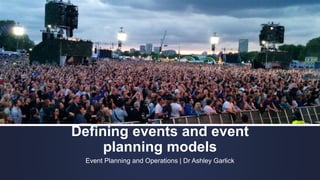
Defining events and planning models
- 1. Defining events and event planning models Event Planning and Operations | Dr Ashley Garlick
- 2. Learning outcomes By the end of the session, you will be able to: Define an event and describe the roles found in event management Describe the stages of planning an event Compare and analyse different theoretical planning models
- 3. Where would you look to find a definition?
- 4. Event Definitions ‘A unique moment in time celebrated with ceremony and ritual to satisfy specific needs’ (Goldblatt, 2020) ‘Events are temporary occurrences, either planned or unplanned. They have a finite length, and for planned events this is usually fixed and publicized. People know and expect that events end, and this fact provides a major part of their appeal’ (Getz and Page, 2016) ‘Those non-routine occasions set apart from the normal activity of the daily life of a group of people’ (Shone and Parry, 2019) Getz, D. and Page, S. (2016). Event Studies: Theory, research and policy for planned events. 3rd edition. London: Butterworth-Heinemann. Lee, S. and Goldblatt, J. (2020). Special Events: The brave new world for bolder and better live events. 8th edition. New York: Wiley. Shone A, and Parry B. (2019). Successful Event Management: A practical handbook. 5th Edition, Hampshire: Cengage Learning.
- 5. Source: Dowson, R. & Bassett, D. (2018). Event Planning and Management: Principles, planning and practice. 2nd edtion. London: Kogan Page. An event is a planned gathering An event is memorable An event is temporary Defining an event
- 6. An event is comprised of a combination of tangible and intangible elements put together using imaginative and creative thinking
- 7. What makes an event? An event = ‘anything that happens, as distinguished from anything that exists’ (dictionary definition) ‘An occurrence, especially one of great importance’ Events are things of significance that happen An event is generally about celebrating or commemorating a special occasion
- 8. What makes event management? As a function Something that people do As a field of research Something that people seek to understand
- 9. What makes an event manager? If management is the organisation and coordination of resources and activities, then the manager is the person responsible for this The role of an event manager can often differ from other managers due to the nature of events – temporal, unique and involving people
- 10. Event role areas Venue staff Production staff Front of house / security Press & PR Medical Suppliers Artists
- 11. Event roles Singers Musicians Entertainers Entourage Caterers Decorators Florist First Aiders Welfare HCPs Press Officer PR Manager Hosts Steward Security Cloakroom Reception Box office Traffic management VIP liaison Cleaners Litter pickers Riggers Sound engineers Stagehand Runners Artist Liaison Production Manager Production Office Site ops Electricians Safety Officer Bar staff Waiters Car park Porters Venue staff Production staff Front of house / security Press & PR Medical Suppliers Artists
- 12. Statutory services • Ambulance • Police • Fire service • Local authority
- 14. 1. Using the lead-in period 2. Developing the client relationship 3. Getting the suppliers 4. Finding the venue 5. Building the budget
- 15. Bowdin, G. Allen, J. O’Toole, W. Harris, R. McDonnell, I. (2011), Events Management. 3rd edition. Oxford, UK: Elsevier. p.190. Event planning process
- 16. Lee, S. and Goldblatt, J. (2020). Special Events: The brave new world for bolder and better live events. 8th edition. New York: Wiley. Research Design Planning Coordination Evaluation The event management process
- 17. (EMBOK) Silvers, J. (2012). Professional Event Coordination. 2nd edition. New Jersey: Wiley. Event Management Body of Knowledge
- 18. CONTINUOUS IMPROVEMENT CREATIVITY ETHICS INTEGRATION STRATEGIC THINKING INITIATION PLANNING IMPLEMENTATION EVENT CLOSURE E CI I ST C ADMINISTRATION DESIGN MARKETING OPERATIONS RISK CLASSES I P IM C E PHASES ASSESS SELECT MONITOR COMMUNICATE DOCUMENT DOMAINS The EMBOK is a framework that consists of a variety of facets that represent the fundamentals of events management. It brings together the functions of event management with the event planning process, as well as provides a structure that facilitates collecting, analyzing, and retrieving the knowledge surrounding event management. The International EMBOK Model © 2005, International EMBOK Executive, All Rights Reserved
- 19. Source: Torkildsen, G. (2011). Sport and Leisure Management. 6th edition. Oxon, UK: Routledge.
- 21. What’s in a plan? Source: Silvers, J. (2012). Professional Event Coordination. 2nd edition. New Jersey: Wiley.
- 22. Any questions?
Editor's Notes
- When event professionals talk about an event they are not talking about natural phenomena but about planned gatherings of people….some involve family & friends, others businesses and work colleagues, other strangers!
- 1. Lead-in: What happens during the lead-in period Planning - Booking entertainment Venue sourcing - Sourcing suppliers Client liaison - Liaison with suppliers, such as caterers Research - Producing documents, such as the production schedule Fact-finding - Invitations and tickets The impact of a short lead-in Limits creativity – no time - Unavailability of suppliers and venues Limits choice - Compromises decisions Costs more - Reactive management (not proactive management) 2. Client Relationship Where to find a client – networking; other events; guides and directories; direct targeting to organisations; referrals; repeat business The importance of developing the client relationship – also important for repeat business and referrals to new clients Managing the client during the event process – before, during and afterwards 3. Suppliers Building a supplier list Knowing your suppliers Trusting your suppliers Relying on your suppliers Your legacy is in the hands of your suppliers 4. Venue Knowing where to find venues Guides/directories Online websites Venue brochures City tourist guides Walking round the city to identify venues Your relationship with the venue Trusting the venue Proposing venues to the client 5. Budget Building the budget What is included in the budget Contingency Controlling the budget
